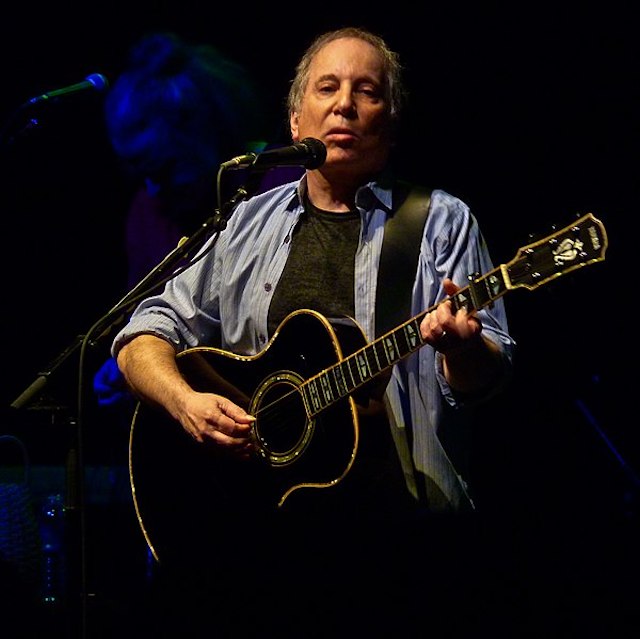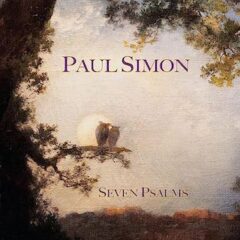
Paul Simon: Offering a brief collection of seven interwoven tracks all reflecting on matters of faith, spirituality and death (Photo: Matthew Straubmuller)
By Billy Altman
 SEVEN PSALMS
SEVEN PSALMS
Paul Simon
Owl Records/Legacy Recordings
It may be apocryphal, but it’s still a good story. Two great songwriters were sitting around discussing their craft when the subject of religion came up, and it was noted that one of them seemed to reference Jesus Christ quite a bit in his works. Which led a confused Paul McCartney to ask Paul Simon, “Aren’t you Jewish?”

The Seven Psalms trailer
He is, of course, and so that’s a pretty interesting question to consider–especially since Simon’s latest release, Seven Psalms, has arrived five years after his 2018 self-announced “final” tour as a live performer and some related statements to the effect that his on-the-record composing days were over. On one level, this brief (33 minute) collection of seven interwoven tracks all reflecting on matters of faith, spirituality and death would seem to be just the latest in a series of recent albums by long term artists such as Leonard Cohen and David Bowie reflecting on their own mortality due to terminal illnesses. Yet the 81-year-old Simon has taken pains in interviews for the run-up to Seven Psalms’ release to dispel any notions that its creation was driven by health issues or even just a conscious eye on the proverbial life clock. He’s revealed that the project’s, er, genesis began in 2019 when he awoke from a dream and, like the vision in “Sound of Silence” that left its seeds while he was sleeping, what was planted in Paul Simon’s brain this time were two words: “Seven Psalms.” In the ensuing months, he says he would regularly wake up in the middle of the night with bits of poetry stuck in his head and, looking for meaning, he eventually came to a realization that he was being compelled to bring Seven Psalms to life as a full-fledged collection. And so, even though he wasn’t expecting to formally write or record any new music, he decided to go ahead and do so. After all, he’s contended, “It wasn’t my idea.”
Of course, that semi-facile answer begs the very real question, “Then whose was it?” Putting that one aside (if that’s indeed possible), listening to Seven Psalms is a curious experience, as Simon spends most of the album working around the edges of what it means to have faith and retain in when so much of life can seem random and hard to make sense of, let alone when contemplating the hereafter. The leadoff track, “The Lord”–interestingly, it’s centered on a guitar phrase reminiscent of “Anji,” the Simon & Garfunkel instrumental from 1966’s Sounds of Silence LP–finds Simon “thinking about the Great Migration,” and posing neatly drawn, albeit hardly profound, examples of the presence on earth of a higher being. “The Lord is a virgin forest/The Lord is a forest ranger,” sings Simon. “The Lord is my engineer/The Lord is the train I ride on.” From that basic, recurring theme, the set segues into assorted ruminations, such as “Love is Like A Braid,” which notes that “The garden keeps a rose and a thorn/And once the choice is made/All that’s left is mending what was torn,” and “In My Professional Opinion,” wherein Simon makes clear that he’s not here to furnish any revelatory answers to questions about the meaning of life: “I’m not a doctor of a preacher/ I’ve no particular guiding star/In my professional opinion/I’m no more satisfied than you are.”

On Q with Tom Parker, Paul Simon discusses the origins of and big ideas on Seven Psalms
Propelled by Simon’s as-ever meticulous acoustic guitar work, some of Seven Psalms’ best moments come in his two gentle duets with his wife, singer Edie Brickell, most notably on the final selection, “Wait,” which expresses a conscious desire to envision heaven as “A beautiful place…almost like home.” Still, the track this listener keeps coming back to is “Your Forgiveness,” an internal conversation about the struggle to balance facts and faith. “I have my reasons to doubt/A white light eases the pain/two billion heartbeats and out/Or does it all begin again?” Yet Simon confesses that “I, the last in line/Hoping the gates won’t be closed/Before your forgiveness.” It is in this brief passage that one hears at least one connection to the Hebrew faith Paul Simon was born into, as it’s a reference to the closing service of the day-long prayers associated with Yom Kippur, the Day of Atonement, wherein sinners pleads for forgiveness from God as the gates to heaven close and the inscribed entries in the Book of Life (and death) for the upcoming year are irrevocably sealed. Significantly, it is during the Day of Atonement that cantors sing a special prayer asking God’s help to give them the strength to shoulder the responsibilities of leading their congregations at the most solemn moment of the year. The prayer is called “Hineni,” which translates in English to “Here I Am”–an important Bible-associated phrase that one trusts at least some Paul Simon fans will recognize from its memorable use in the 1970 Simon and Garfunkel song “The Only Living Boy in New York.” Paul McCartney, take note.
The Paul Simon photo above is used under the terms of Attribution 2.0 Generic (CC BY 2.0) license. No alterations have been made to the original photograph.


